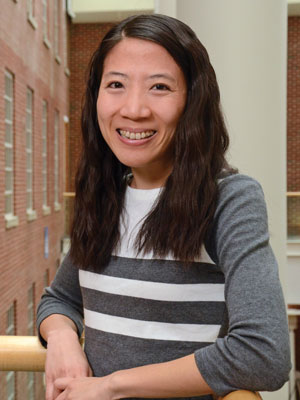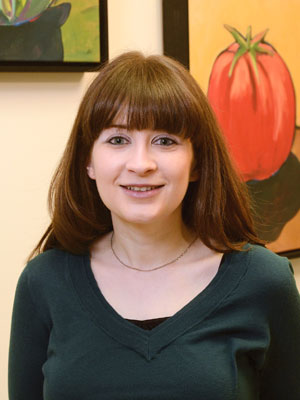Four public health students win Graduate School’s Impact Award for research that benefits North Carolina
Graduate School also honors other public health awardees
April 22, 2014
Four of the 20 students recognized by UNC’s Graduate School for research that has impact upon the people of North Carolina are students at the Gillings School of Global Public Health. A fifth student, an advisee of epidemiology professor Ralph Baric, PhD, is affiliated with the School.
The students are alumnus Paul Gilbert, PhD (health behavior), Lindsey Haynes-Maslow (health policy and management), Cynthia Lin (epidemiology) and Jennifer Poti (nutrition). Kari Debbink (microbiology and immunology, UNC School of Medicine) conducts research in Baric’s lab.
Paul Gilbert: Increasing Understanding of Stressors, Alcohol Use
Gilbert conducted a mixed-methods study, with participants from North Carolina, focused on understanding alcohol use among immigrant sexual- and gender-minority Latinos—an especially vulnerable subgroup of the population. He described the key social stressors and coping strategies, particularly the role of alcohol use, and tested social support’s effectiveness in moderating any relationship between stressors and alcohol use.
Gilbert recruited a committee of academics, community members (including gay- and transgender-identified Latinos), and a representative of a social service organization that serves Latinos to provide key assistance.
Being a sexual minority was found to be a key stressor, as nearly all study participants reported pervasive homophobia within their families and the local Latino community. Being a sexual minority was linked to alcohol use through drinking venues, one of the few locations where participants indicated they could socialize freely and find support. Ethnic discrimination was strongly associated with any drinking and binge drinking.
Gilbert’s study findings may inform policies created to integrate and support Latino residents of North Carolina.
“Paul’s dissertation addressed an overarching public health problem in North Carolina by developing a comprehensive understanding of social stressors and coping strategies,” said his adviser Eugenia Eng, DrPH, professor of health behavior at the Gillings School.
Lindsey Haynes-Maslow: Eliminating Barriers to Fruit and Vegetable Consumption
Rankings place North Carolina in the top 10 of agricultural producing states in the country – yet it also ranks in the top 10 for food insecurity.
Doctoral student Lindsey Haynes-Maslow’s dissertation research focuses on ways to increase fruit and vegetable consumption in underserved communities in North Carolina. Her analysis relies on data from 13 focus groups she conducted with adults from underserved areas of Buncombe, Durham, Guilford, New Hanover and Orange counties.
Participants shared thoughts on their access to fresh fruit and vegetables, current grocery shopping behaviors, perceived barriers to accessing fruit and vegetables in their community and strategies that could improve access in their community.
Haynes-Maslow found that while proximity to fresh fruits and vegetables is a necessity, it may not be sufficient for improving fruit and vegetable consumption.
Understanding the relationship between fruit and vegetable access and consumption is a critical step toward addressing the obesity epidemic in North Carolina, and Haynes-Maslow’s research continues to examine this issue.
“Since I’ve known Lindsey, she has consistently expressed an interest in research opportunities that will help identify successful prevention strategies to improve health outcomes of low-income populations in North Carolina,” said adviser Pam Silberman, JD, DrPH. Silberman is clinical professor of health policy and management at the Gillings School and president of the N.C. Institute of Medicine.
Cynthia Lin: Protecting the Health of Coastal Swimmers
Stormwater runoff is a major source of coastal water contamination—it can carry many different types of pollution and be discharged directly into the ocean. This can create an occupational health hazard for lifeguards, surf instructors and others who spend time in the ocean.
Lin, who recently received her master’s degree, sought to better understand the relationship between exposures to microbial water contamination and illness reports from lifeguards and surf instructors in North Carolina. During a 14-week period at the Outer Banks, she collected and analyzed survey data and routine water samples at the time and location of study participant exposure.
Even among young and healthy lifeguards and surf instructors at a location with generally low levels of fecal indicator bacteria, Lin found an increase in illness on days with water exposure compared to days without. She also observed a similar increase in illness related to a five-to-seven day incubation period after water exposure. Her findings did not indicate that the presence or absence of fecal indicator bacteria influenced any symptoms of illness.
Lin’s study provides important new knowledge to protect the health of all those who live, work and play along North Carolina’s coast.
“Cynthia’s research on the Outer Banks of North Carolina addressed a question for which there is little prior information: Can microbial contamination of ocean water from runoff sicken swimmers?” said adviser Steve Wing, PhD, associate professor of epidemiology at the Gillings School.
Jennifer Poti: What Are Key Factors in Childhood Obesity?
An estimated one-third of U.S. children are overweight or obese, and North Carolina has the fifth highest prevalence of childhood obesity within the 50 states. Doctoral student Jennifer Poti’s research looks comprehensively at factors that may contribute to poor dietary quality and obesity among children.
Poti designed a study using data on U.S. children’s eating habits, collected from 1977 to 2006. She found that increases in total calorie intake among U.S. children in the years examined were driven by major increases in eating away from home. Her study established fast food as the largest contributor to food prepared away from home for all age groups of children, but determined that two-thirds of children’s calorie intake comes from supermarkets and grocery stores.
Her research determined that an unhealthy Western dietary pattern from grocery stores and schools was more strongly associated with obesity and poor dietary quality than was fast food consumption.
Poti identified specific foods and locations to target for improvement, and her study findings have been used by the U.S. Department of Agriculture in developing revised federal nutrition standards for the school meals programs.
“Jennifer’s work has documented the influential role of supermarkets, grocery stores and other food stores and identifies the need to focus efforts in North Carolina on this major contributor to children’s diets,” said adviser Barry Popkin, PhD. Popkin is W.R. Kenan Jr. Distinguished Professor of nutrition at the Gillings School.
Kari Debbink: Working Toward a Norovirus Vaccine
“Kari has made seminal contributions to the norovirus field, identifying key sites of virus evolution that not only inform the development of diagnostic assays to identifying new pandemic strains, but also provide rational strategies and targets for improved vaccine and immunotherapeutic design,” said adviser Ralph Baric.
Noroviruses are the primary cause of acute gastrointestinal disease in North Carolina, with an estimated 645,000 infections in the state annually. They cause an estimated 21 million infections nationwide.
One particular type, GII.4 noroviruses, accounts for approximately 78 percent of North Carolina outbreaks.
Currently, there are no approved norovirus vaccines or therapeutics due to an incomplete understanding of the mechanisms involved with GII.4 norovirus evolution and factors contributing to human protective immunity.
Debbink’s research aims to reduce disease caused by noroviruses. GII.4 noroviruses undergo an evolutionary pattern similar to influenza, whereby one predominant circulating strain is replaced by a new emergent strain. She studied non-infectious virus-like particles, which represented epidemic norovirus strains, and performed biological assays that measure activities such as antibody binding and potential neutralization.
By tracking how the GII.4 norovirus evolves, Debbink’s work may contribute to the design of successful vaccines and minimize the economic impact that results from lost productivity, decontamination costs and healthcare expenses.
The Graduate School’s annual Graduate Education Advancement Board Impact Awards recognize graduate students for contributions they are making to our state. The awards are made possible through the support of the Graduate Education Advancement Board (GEAB), whose members believe in the importance of graduate education at Carolina.
Other achievements recognized at the April 24 awards ceremony
Biostatistics
- Nicolas Ballarini, Fulbright Fellowship for non-U.S. students
- Noorie Hyun, JSM Student Travel Award
- Qian Liu, ENAR Distinguished Student Paper Award 2014
- Xioaxi Liu, ENAR Distinguished Student Paper Award 2014
- Ai Ni, ENAR Distinguished Student Paper Award 2014
- Fang-Shu Ou, ENAR Distinguished Student Paper Award 2014
- Kin Yau Wong, Croucher Scholarship for Doctoral Study
- Jing Zhou, ENAR Distinguished Student Paper Award 2014
Environmental Sciences and Engineering
- Maura Allaire, NSF Graduate Research Fellowship Program
- Maiko Arashiro, NSF Graduate Research Fellowship Program
- Annalise Blum, NSF Graduate Research Fellowship Program
- Shih Ying Chang, Republic of China Scholarship
- Kristen Downs, Jack Cooke Kemp Scholar
- Benjamin Foster, NSF Graduate Research Fellowship Program
- Katie Friedman, NSF Graduate Research Fellowship Program
- Sarah Hatcher, NSF Graduate Research Fellowship Program
- Panitan Jutaporn, Royal Thai Scholarship
- Jordan Kern, Hydro Research Foundation
- Eliot Meyer, Hydro Research Foundation
- Maya Nadimpalli, Graduate and Professional Student Federation (GPSF) Graduate Student Award for Excellence in Mentorship; EPA-STAR (Science to Achieve Results) Fellowship
- Julia Rager, Syngenta Fellowship Award in Human Health Applications of New Technologies; Graduate Student Novartis Award
- Maria Silva, Portugese Foundation for Science and Technolgy Doctoral Fellowship/Grant – Government of the Portugese Republic
- Jamie Smedsmo, Department of Energy Computational Science Graduate Fellowship
- Alice Wang, EPA-STAR (Science to Achieve Results) Fellowship
- Hong Sik Yoo, AstraZeneca Co-funded Bioscience PhD Studentship
- Yvonne Yuen, EPA-STAR (Science to Achieve Results) Fellowship
Epidemiology
- Lindsay Fernandez-Rhodes, American Heart Association Predoctoral Fellowship
- Kim Gaetz, EPA-STAR (Science to Achieve Results) Fellowship
- Shannon Kapuaola Gellert, NRSA Fellowships for Minority Students (F31) NIH – National Heart, Lung and Blood Institute
- Shakia hardy, Gates Millennium Scholarship
- Chantel Martin, NRSA Fellowship (F31) NIH- National Institute of Diabetes and Digestive and Kidney Diseases
- Timothy Platts-Mills, NIH-National Institute on Aging K23 Award – Mentored Patient-Oriented Research Development Award
- Shabbar Ranapurwala, SOPHE/CDC Student Fellowship in Injury Prevention
- Elizabeth Rogawski, American Society of Tropical Medicine and Hygiene Travel Award
- Diana Sanchez, NRSA Fellowships for Minority Students (F31) NIH – National Institute of Child Health and Human Development
Health Behavior
- Jennifer Grant, Graduate School Leadership Development Scholar
- Sarah Hiller, Graduate School Leadership Development Scholar
- Cristina Leos, Gates Millennium Scholarship
- Marta Mulawa, NRSA Fellowship (F31) NIH – National Institute of Mental Health
- Caitlin Snyder, Graduate School Leadership Development Scholar
- Laura Villa Torres, CONACYT (Mexican National Council for Science and Technology) Scholarship
Health Policy and Management
- Lee Katherine Ayer, Andrea M. Rossiter FACMPE Scholarship
- Ila Broyles, Agency for Healthcare Research and Quality Health Services Research Dissertation Award
- Alyssa Bullard, Gates Millennium Scholarship
- Ximena Calvo Palma, Chilean Government Scholarship
- Rachel Dolin, NSF Graduate Research Fellowship Program
- Jerome Federspiel, NRSA Fellowship (F30) NIH – For MD/PhD Students – National Heart, Lung and Blood Institute
- Nnenna Ibeanusi, Gates Millennium Scholarship
- Mohamed Jalloh, HCA Corris Boyd Scholars Program
- Van Nghiem, Vietnam Education Foundation Fellowship Program
- Sarah Rutstein, NRSA Fellowship (F30) – For MD/PhD Students – National Institute of Mental Health
Maternal and Child Health
- Susannah Zietz, Mount Holyoke Alumnae Association Dr. Mary P. Dole Fellowship
Nutrition
- Elizabeth Alexy, Frances E. Fischer Memorial Scholarship from the Academy of Nutrition and Dietetics Foundation
- Beth Hopping, NSF Graduate Research Fellowship Program
- Leanne Kaye, Patsyjane O’Malley Memorial Scholarshiip from the Academy of Nutrition and Dietetics Foundation
- Rouba Kouwatli, Fulbright Scholarship for Non-U.S. Students
- Lisa Letourneau, Frances E. Fischer Memorial Scholarship from the Academy of Nutrition and Dietetics Foundation
- Amy Roberts, Merit Award, Hacker School in New York City; Explorer, Google Glass
- Lindsey Smith, University Research Day award for oral presentation
- Dalia Stern, CONACYT (Mexican National Council for Science and Technology) Scholarship
Public Health Leadership
- Manish Kumar, Rotary World Peace Fellowship
- Claire Thomson, AAFP National Conference First-Time Student Attendee Award
- Spencer Lindgren was inducted into the Order of the Old Well, an honorary organization founded in 1949 to honor students for exemplary and otherwise unrecognized service to the university.
Read more about these and other winners on The Graduate School’s website.





